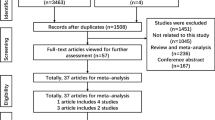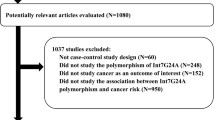Abstract
The association between the rs7003908 (T>G) polymorphism in the XRCC7 gene and the risk of cancers had been widely studied; however, the results were inconsistent. The objective of the current study was to investigate the association between the rs7003908 polymorphism in the XRCC7 gene and the risk of cancers by meta-analysis. We searched PubMed, EMbase, CNKI and Wanfang databases; the last search was performed on January 10th, 2014. Statistical analysis was performed using the Revman4.2 and STATA10.0 softwares. A total of 3,684 cancer cases and 5,232 controls from 11 case–control studies were included for data analysis. In the dominant model analysis, the results suggested a lack of association between the polymorphism and the risk of cancers: OR 1.01, 95 % CI 0.83–1.16, P = 0.70. In the subgroup analysis by ethnicity, no significant association was found either for Asians or Caucasians. In the subgroup analysis by cancer types, significant association was found for prostate cancer, but not for bladder cancer, breast cancer and glioma. In summary, the current meta-analysis confirmed that the rs7003908 polymorphism in the XRCC7 gene might be a risk factor for prostate cancer. In the future, more studies are needed to validate these results.



Similar content being viewed by others
References
Braithwaite D, Boffetta P, Rebbeck TR, Meyskens F (2012) Cancer prevention for global health: a report from the ASPO International Cancer Prevention Interest Group. Cancer Epidemiol Biomarkers Prev 21(9):1606–1610. doi:10.1158/1055-9965.EPI-12-0848
Beaglehole R, Bonita R, Magnusson R (2011) Global cancer prevention: an important pathway to global health and development. Public Health 125(12):821–831. doi:10.1016/j.puhe.2011.09.029
Ahn J, Sinha R, Pei Z, Dominianni C, Wu J, Shi J, Goedert JJ, Hayes RB, Yang L (2013) Human gut microbiome and risk for colorectal cancer. J Natl Cancer Inst 105(24):1907–1911. doi:10.1093/jnci/djt300
Rosenfeldt MT, O’Prey J, Morton JP, Nixon C, MacKay G, Mrowinska A, Au A, Rai TS, Zheng L, Ridgway R, Adams PD, Anderson KI, Gottlieb E, Sansom OJ, Ryan KM (2013) p53 status determines the role of autophagy in pancreatic tumour development. Nature 504(7479):296–300. doi:10.1038/nature12865
Baykara O, Tansarikaya M, Demirkaya A, Kaynak K, Tanju S, Toker A, Buyru N (2013) Association of epidermal growth factor receptor and K-Ras mutations with smoking history in non-small cell lung cancer patients. Exp Ther Med 5(2):495–498. doi:10.3892/etm.2012.829
Zhou HF, Feng X, Zheng BS, Qian J, He W (2013) A meta-analysis of the relationship between glutathione S-transferase T1 null/presence gene polymorphism and the risk of lung cancer including 31802 subjects. Mol Biol Rep 40(10):5713–5721. doi:10.1007/s11033-013-2674-4
Groselj B, Sharma NL, Hamdy FC, Kerr M, Kiltie AE (2013) Histone deacetylase inhibitors as radiosensitisers: effects on DNA damage signalling and repair. Br J Cancer 108(4):748–754. doi:10.1038/bjc.2013.21
Romick-Rosendale LE, Lui VW, Grandis JR, Wells SI (2013) The Fanconi anemia pathway: repairing the link between DNA damage and squamous cell carcinoma. Mutat Res 743–744:78–88. doi:10.1016/j.mrfmmm.2013.01.001
Zhi Y, Yu J, Liu Y, Wei Q, Yuan F, Zhou X, Song B, Chen Z, Yang J (2012) Interaction between polymorphisms of DNA repair genes significantly modulated bladder cancer risk. Int J Med Sci 9(6):498–505. doi:10.7150/ijms.4799
Hirata H, Hinoda Y, Tanaka Y, Okayama N, Suehiro Y, Kawamoto K, Kikuno N, Majid S, Vejdani K, Dahiya R (2007) Polymorphisms of DNA repair genes are risk factors for prostate cancer. Eur J Cancer 43(2):231–237. doi:10.1016/j.ejca.2006.11.005
McKean-Cowdin R, Barnholtz-Sloan J, Inskip PD, Ruder AM, Butler M, Rajaraman P, Razavi P, Patoka J, Wiencke JK, Bondy ML, Wrensch M (2009) Associations between polymorphisms in DNA repair genes and glioblastoma. Cancer Epidemiol Biomarkers Prev 18(4):1118–1126. doi:10.1158/1055-9965.EPI-08-1078
Nasiri M, Saadat I, Omidvari S, Saadat M (2012) Genetic variation in DNA repair gene XRCC7 (G6721T) and susceptibility to breast cancer. Gene 505(1):195–197. doi:10.1016/j.gene.2012.04.065
Hirata H, Hinoda Y, Matsuyama H, Tanaka Y, Okayama N, Suehiro Y, Zhao H, Urakami S, Kawamoto K, Kawakami T, Igawa M, Naito K, Dahiya R (2006) Polymorphisms of DNA repair genes are associated with renal cell carcinoma. Biochem Biophys Res Commun 342(4):1058–1062. doi:10.1016/j.bbrc.2006.02.030
Mandal RK, Kapoor R, Mittal RD (2010) Polymorphic variants of DNA repair gene XRCC3 and XRCC7 and risk of prostate cancer: a study from North Indian population. DNA Cell Biol 29(11):669–674. doi:10.1089/dna 2010.1047
Wang G, Wang S, Shen Q, Yin S, Li C, Li A, Li J, Zhou J, Liu Q (2009) Polymorphisms in XRCC5, XRCC6, XRCC7 genes are involved in DNA double-strand breaks(DSBs) repair associated with the risk of acute myeloid leukemia(AML) in Chinese population. J Nanjing Med Univ 23(2):93–99
Wang LE, Bondy ML, Shen H, El-Zein R, Aldape K, Cao Y, Pudavalli V, Levin VA, Yung WK, Wei Q (2004) Polymorphisms of DNA repair genes and risk of glioma. Cancer Res 64(16):5560–5563. doi:10.1158/0008-5472.CAN-03-2181
Wang SY, Peng L, Li CP, Li AP, Zhou JW, Zhang ZD, Liu QZ (2008) Genetic variants of the XRCC7 gene involved in DNA repair and risk of human bladder cancer. Int J Urol 15(6):534–539. doi:10.1111/j.1442-2042.2008.02049.x
Ye XH, Bu ZB, Feng J, Peng L, Liao XB, Zhu XL, Sun XL, Yu HG, Yan DF, Yan SX (2014) Association between the TP53 polymorphisms and lung cancer risk: a meta-analysis. Mol Biol Rep 41(1):373–385. doi:10.1007/s11033-013-2871-1
Xu J, Lin X, Zhu H, Zhang Z, Yang B (2013) Genetic variation of the CYP17 and susceptibility to endometrial cancer: a meta-analysis. Mol Biol Rep 40(8):5085–5091. doi:10.1007/s11033-013-2609-0
Zhang L, Yan JW, Wang YX, Wan YN, Li JP, Liu P, Xu B, Wang BX, Peng WJ, Pan FM, Wang J (2013) Association of TGF-beta1 +869C/T promoter polymorphism with susceptibility to autoimmune diseases: a meta-analysis. Mol Biol Rep 40(8):4811–4817. doi:10.1007/s11033-013-2577-4
Bhatti P, Struewing JP, Alexander BH, Hauptmann M, Bowen L, Mateus-Pereira LH, Pineda MA, Simon SL, Weinstock RM, Rosenstein M, Stovall M, Preston DL, Linet MS, Doody MM, Sigurdson AJ (2008) Polymorphisms in DNA repair genes, ionizing radiation exposure and risk of breast cancer in US Radiologic technologists. Int J Cancer 122(1):177–182. doi:10.1002/ijc.23066
Gangwar R, Ahirwar D, Mandhani A, Mittal RD (2009) Do DNA repair genes OGG1, XRCC3 and XRCC7 have an impact on susceptibility to bladder cancer in the North Indian population? Mutat Res 680(1–2):56–63. doi:10.1016/j.mrgentox.2009.09.008
Acknowledgments
This study is support by the Applied Basic Research Projects of Sichuan Province (2013JY0032).
Author information
Authors and Affiliations
Corresponding author
Rights and permissions
About this article
Cite this article
Xiao, M., Shen, Y., Chen, L. et al. The rs7003908 (T>G) polymorphism in the XRCC7 gene and the risk of cancers. Mol Biol Rep 41, 3577–3582 (2014). https://doi.org/10.1007/s11033-014-3220-8
Received:
Accepted:
Published:
Issue Date:
DOI: https://doi.org/10.1007/s11033-014-3220-8




